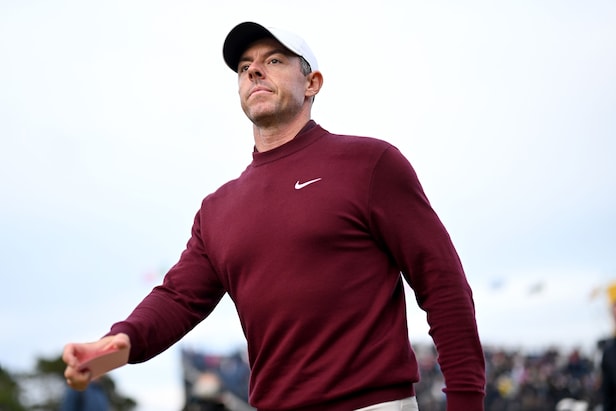[PHOTO: Oisin Keniry/R&A]
How does the PGA Tour sell that the FedEx Cup matters when the actions of one of its biggest stars essentially say the opposite?
That is the legitimate worry surrounding Rory McIlroy’s absence this week as the tour’s three-event postseason series begins with the FedEx St Jude Championship in Memphis. But the outrage that has followed reveals little about McIlroy’s commitment and is missing the point. The problem isn’t the player; it’s the product.
RELATED: Rory McIlroy’s money and position are set, so skipping first FedEx Cup Playoffs event won’t hurt him
McIlroy’s decision was hardly spontaneous. He telegraphed this move throughout the year, specifically citing last year at TPC Southwind – where he finished second-last yet dropped only two spots in the points standings – as proof that his participation carries minimal competitive consequence in the current structure. This strategic absence is not new; McIlroy did the same in 2015 and 2018, and follows an established playbook. Tiger Woods skipped the inaugural FedEx Cup event in 2007 and went on to claim the tour’s “ultimate prize”. That year, Phil Mickelson, leading the standings after winning the second tournament, passed on the third playoff event in Chicago despite playing in a corporate outing.
Yet McIlroy’s absence sparked reactions this week after PGA Tour player director Peter Malnati told Golfweek he was “very concerned” and alluded to possible future measures to prevent players from skipping playoff events. Social media was quick to label any measure the “Rory Rule”.
The timing couldn’t be more perfect for manufactured drama. August represents the dead zone of the American sports calendar, when fans and media desperately grasp for storylines worth dissecting. What should have been a footnote about schedule management has metastasised into a capital-T Thing, with pundits debating what this reveals about McIlroy’s character, the tour’s authority and the postseason’s legitimacy. Meanwhile, the players actually competing in Memphis have been reduced to background noise in their own tournament.
The irony would be delicious if it weren’t so damning. For two decades, the PGA Tour has desperately tried to create buzz around its postseason, only to do so through controversy rather than competition.
Part of the discussion relies on false equivalencies. Critics invoke NFL quarterbacks who would never skip playoff games, which is so obvious it’s barely worth repeating. But other sports’ playoffs represent the undisputed apex of their games. In golf’s established hierarchy, the four majors, the Players Championship and Ryder Cup command that reverence and respect from fans and players alike. The FedEx Cup, despite its bonus pools, occupies a different tier. No amount of prizemoney or branding changes that reality.
RELATED: The 7 most intriguing storylines heading into the PGA Tour’s playoffs
And context is needed. This isn’t an epidemic requiring legislative response. McIlroy is the only player among 70 qualifiers to skip Memphis. To him, rest before a gruelling end-of-year stretch – including the final two playoff events, the Ryder Cup, DP World Tour playoffs and tournaments in India and Australia – outweighs one playoff event. It’s nothing more than load management in a year that has burnt him out.
To be fair, Malnati’s concern cuts deeper than optics. McIlroy’s absence – and the potential for other stars to follow such a path – undoubtedly creates a cascade of disappointed stakeholders: TV networks that paid premium rates expecting McIlroy and corporate partners who tied their investment to starpower. Officials with FedEx, pumping nine figures into the playoffs bearing their name, will watch their marquee event in their corporate hometown proceed without arguably the tour’s most marketable player, representing the kind of sponsor-relations failure that keeps executives awake. Forcing players to compete in all three playoff events perhaps solves that. But this crisis illuminates the playoffs’ vulnerability – its dependence on individual starpower rather than intrinsic competitive value. When one player’s absence threatens your entire narrative, the foundation was already shaky.
McIlroy deserves some criticism here. He advocated for signature events in 2022, promising star commitment, then skipped several of those, too. His post-Masters year has included multiple PR missteps. But given the personal and professional turbulence he’s navigated recently, this strategic absence warrants understanding and grace rather than condemnation.
In truth, the FedEx Cup’s identity crisis runs deeper than McIlroy – who, by the way, has won the FedEx Cup a record three times. After nearly two decades of constant tinkering – format changes, points system overhauls, venue shuffling – the playoffs still feel like a solution searching for a problem. Playing in sweltering Memphis in August, bypassing major television markets, moving the BMW Championship like a travelling circus, and employing a points system that confuses even seasoned analysts – these foundational flaws overshadow McIlroy’s strategic rest week.
The PGA Tour has spent years manufacturing urgency and prestige that other sports’ playoffs earn naturally through tradition and genuine competitive necessity. Having McIlroy voluntarily miss one playoff event doesn’t help that quest, but it is a symptom, not a cause. The solution isn’t forcing participation; it’s creating something compelling enough that players wouldn’t want to miss it.

